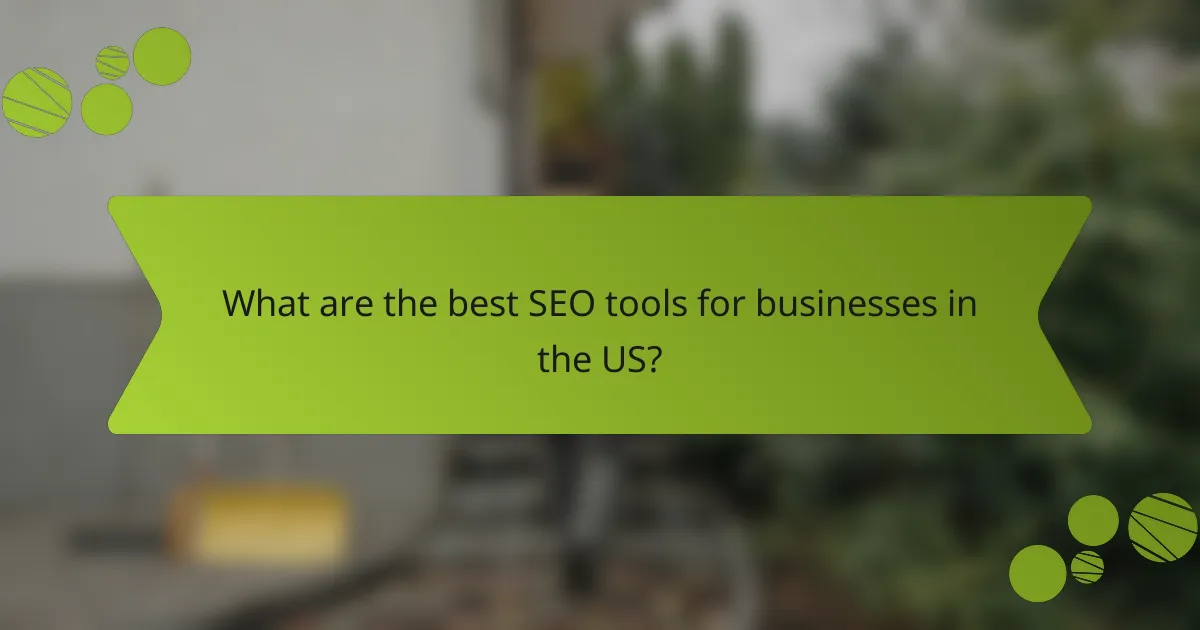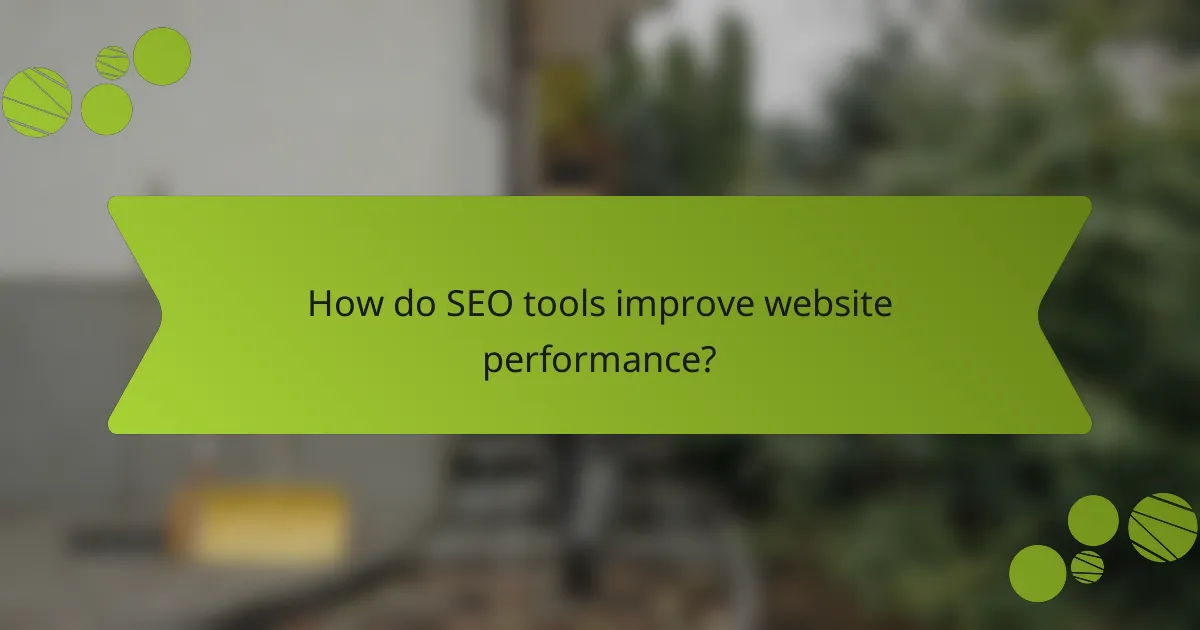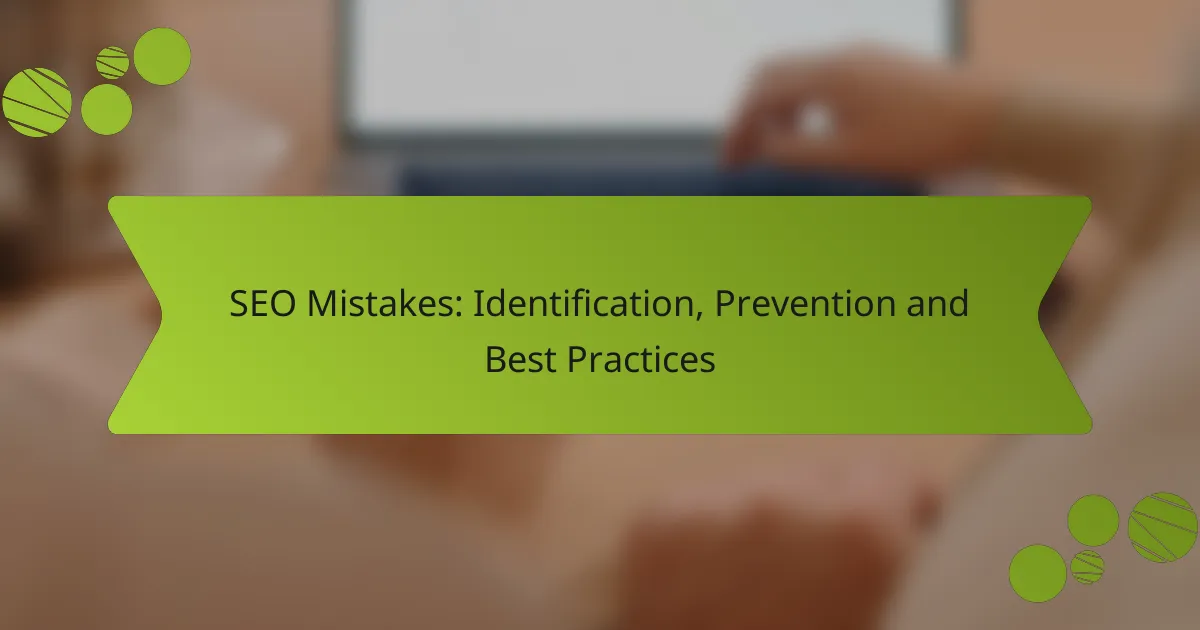SEO tools are essential for businesses aiming to enhance their online presence and drive traffic. They offer functionalities such as keyword research, site audits, and performance tracking, enabling users to optimize their websites effectively. By leveraging these tools, companies can gain valuable insights, identify improvement areas, and make data-driven decisions to boost their visibility in search engine results.

What are the best SEO tools for businesses in the US?
The best SEO tools for businesses in the US include a variety of platforms that help optimize websites for search engines. These tools provide functionalities such as keyword research, site audits, backlink analysis, and performance tracking to improve online visibility and drive traffic.
Ahrefs
Ahrefs is a comprehensive SEO tool known for its powerful backlink analysis capabilities. It allows users to explore their competitors’ link profiles, identify high-quality backlink opportunities, and track their own site’s backlinks over time.
Additionally, Ahrefs offers keyword research tools that help businesses find relevant keywords with search volume data and difficulty scores. This can guide content creation and optimization efforts effectively.
SEMrush
SEMrush is an all-in-one marketing toolkit that provides extensive features for SEO, PPC, and content marketing. Its SEO toolkit includes site audits, keyword tracking, and competitive analysis, making it a versatile choice for businesses looking to enhance their online presence.
One of SEMrush’s standout features is its ability to analyze competitors’ strategies, allowing users to adapt and refine their own SEO tactics. Businesses can also benefit from its content marketing tools, which suggest topics based on keyword research.
Moz
Moz offers a suite of SEO tools designed to improve search engine rankings and visibility. Its key features include site audits, keyword tracking, and a unique metric called Domain Authority, which predicts how well a site will rank.
Businesses can leverage Moz’s community and educational resources to stay updated on SEO best practices. The tool’s user-friendly interface makes it accessible for both beginners and experienced marketers.
Google Search Console
Google Search Console is a free tool provided by Google that helps businesses monitor their website’s performance in search results. It offers insights into how Google crawls and indexes a site, along with data on search queries and click-through rates.
Using Google Search Console, businesses can identify technical issues, submit sitemaps, and receive alerts about potential problems. This tool is essential for understanding how to optimize a site for better visibility in Google search results.
Yoast SEO
Yoast SEO is a popular plugin for WordPress that simplifies on-page SEO optimization. It provides real-time feedback on content readability, keyword usage, and meta tags, helping users create SEO-friendly articles and pages.
With Yoast, businesses can easily manage their SEO settings without needing extensive technical knowledge. The plugin also offers features like XML sitemaps and social media integration, enhancing overall site performance in search engines.

How do SEO tools improve website performance?
SEO tools enhance website performance by providing insights into various aspects of search engine optimization. They help identify areas for improvement, track progress, and optimize content to increase visibility and traffic.
Keyword research
Keyword research is the foundation of effective SEO. It involves identifying the terms and phrases that potential customers use when searching for products or services. Tools can help you discover high-volume keywords with low competition, allowing you to target the right audience.
Consider using tools like Google Keyword Planner or SEMrush to analyze keyword trends and search volume. Aim for a mix of short-tail and long-tail keywords to capture a broader audience while also targeting specific queries.
Site audit capabilities
Site audit features in SEO tools evaluate your website’s technical health. They identify issues such as broken links, slow loading times, and mobile usability problems, which can negatively impact user experience and search rankings.
Regular audits are crucial; aim to perform them at least quarterly. Utilize tools like Ahrefs or Moz to generate comprehensive reports that highlight critical issues and provide actionable recommendations for improvement.
Backlink analysis
Backlink analysis helps you understand your website’s authority and the quality of links pointing to it. High-quality backlinks from reputable sites can significantly enhance your search engine rankings.
Use tools like Majestic or Ahrefs to assess your backlink profile. Focus on acquiring links from relevant and authoritative sources, while also monitoring for toxic links that could harm your site’s reputation.
Content optimization
Content optimization ensures that your website’s content is relevant, engaging, and structured for search engines. This includes optimizing headings, meta descriptions, and using appropriate keywords throughout your content.
Leverage tools like Yoast SEO or Surfer SEO to analyze your content’s performance. Aim for a clear structure with headings and bullet points to enhance readability, and regularly update content to keep it fresh and relevant.

What are the key benefits of using SEO tools?
SEO tools provide essential advantages for improving online visibility and driving traffic. They help businesses analyze their performance, optimize their content, and make informed decisions based on data.
Increased organic traffic
One of the primary benefits of SEO tools is their ability to boost organic traffic. By identifying high-performing keywords and optimizing content accordingly, businesses can attract more visitors without relying on paid advertising.
Utilizing tools like Google Analytics or SEMrush allows for tracking traffic sources and understanding user behavior, which can lead to targeted content strategies. Regularly updating and optimizing content based on these insights can further enhance traffic growth.
Enhanced user experience
SEO tools contribute to a better user experience by analyzing site performance and identifying areas for improvement. Features such as site speed analysis and mobile-friendliness checks help ensure that users have a seamless experience.
For example, tools like Ahrefs can provide insights into page load times and suggest optimizations. A well-optimized site not only retains visitors but also encourages them to engage more with the content.
Improved search rankings
Using SEO tools can lead to higher search engine rankings, which is crucial for visibility. By optimizing on-page elements such as meta tags, headers, and content structure, businesses can improve their chances of ranking higher in search results.
Regularly monitoring keyword rankings with tools like Moz or SERPWatcher allows businesses to adjust their strategies based on performance. Staying updated with algorithm changes and best practices is essential for maintaining and improving rankings over time.
Data-driven decision making
SEO tools enable data-driven decision making by providing actionable insights into website performance and user behavior. This data helps businesses understand what strategies are effective and which areas need improvement.
For instance, analyzing traffic patterns can reveal which content resonates most with users, guiding future content creation. Businesses should regularly review metrics and adjust their SEO strategies to align with user preferences and market trends.

How to choose the right SEO tool for your needs?
Choosing the right SEO tool depends on your specific requirements, including business goals and budget. Consider what features are essential for your operations and how much you are willing to invest in these tools.
Assess specific business goals
Start by identifying your primary objectives, such as increasing website traffic, improving search rankings, or enhancing content quality. Each goal may require different functionalities from an SEO tool, like keyword analysis, backlink tracking, or site audit capabilities.
For example, if your focus is on content marketing, a tool that offers comprehensive keyword research and content optimization features would be beneficial. Conversely, if you aim to enhance your site’s technical SEO, look for tools that provide in-depth site audits and performance tracking.
Evaluate budget constraints
Budget plays a crucial role in selecting an SEO tool. Prices can range from free basic tools to premium subscriptions costing hundreds of dollars per month. Determine how much you can allocate for SEO tools without compromising other areas of your business.
Consider starting with a free or low-cost tool to test its effectiveness before committing to a more expensive option. Many tools offer tiered pricing, allowing you to scale your investment as your needs grow. Always weigh the potential ROI against the cost to ensure you’re making a sound financial decision.









